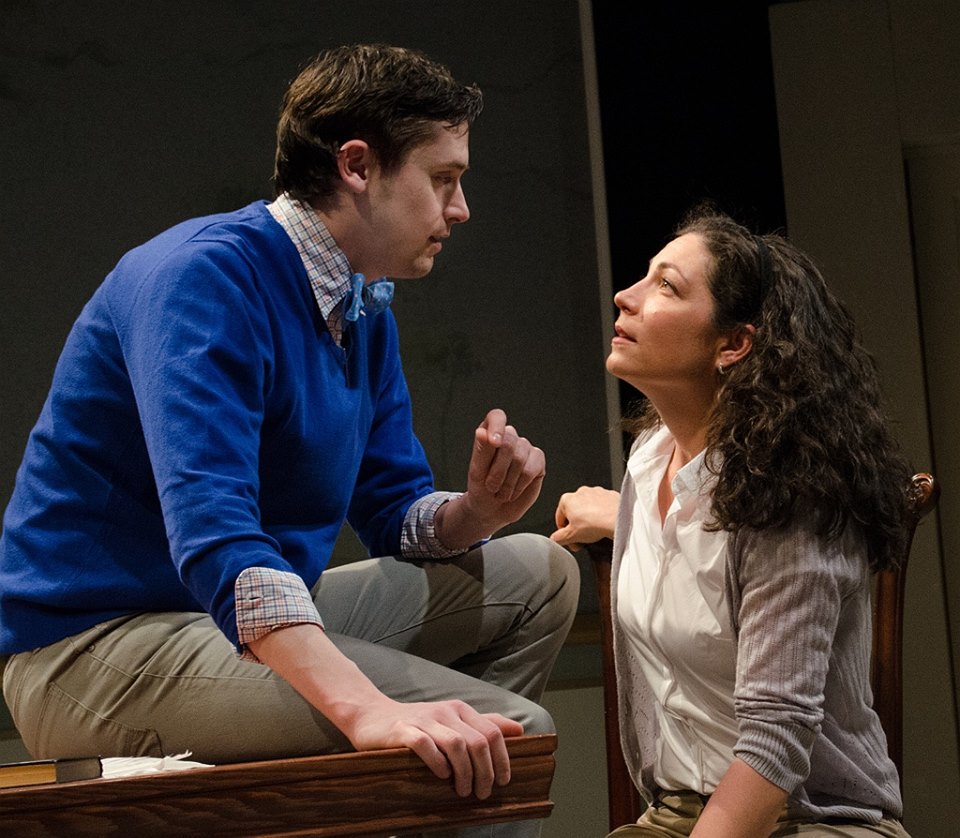
Theatrical Impression: Arcadia at Seattle Public Theater
May 22, 2014Trick Danneker and Alyson Scadron Branner as Valentine and Hannah. Photo by Paul Bestock.
Sex and literature and science and death and paper trails, does any of it matter?
A week ago, a friend of mine from college passed away unexpectedly. He was a poet. He wrote absurd and hilarious haikus alongside immensely deep creative original postmodern works and translations. He was genius, taken too early from this world. Facebook allows you to memorialize a user’s page now, and friends of the deceased can post memories and photos, etc. On this person’s page, people are posting his poetry. I posted a photograph of an autographed piece I’m lucky to have: a photocopied page out of his notebook that says ‘Bonnie and Clyde’ on the left face and ‘Amerika’ on the right face, each repeated fifteen times. A friend of mine called it a “treasure,” and it is. Everything he left behind is now a treasure, a paper trail for us to follow again and again and find new meanings in.
Seeing Arcadia at Seattle Public Theater Thursday night hit me in a special way. As I walked home, I began to put together the parallel. In the circumstances of the play and the mystery surrounding my friend’s passing, only paper remains.
Arcadia is one of my favorite plays. I first saw a production by a drama club when studying abroad in London 7 years ago. The production values were poor but the language was unreal. I was enamored by the concepts and going with my father, a Romantic British Literature scholar, served as a crash course in the mash-up between the Romantic and Enlightenment period, literature and science, piecing together what he knew in detail of George Gordon Lord Byron and what he understood of fractals. I was thoroughly engaged and in love and continued to refer to Arcadia as one of my favorite plays for the years to come.
Seattle Public’s production tackles some of the most difficult aspects of this piece deftly and with great care. When times collide in the same room, the scenes are clear and articulate. The costumes are darling and beautiful–with the exception of Septimus Hodge’s distractingly see-through trousers, seriously, give that man a vest pocket for his watch fob–and the actors plowed through difficult and winding and heady concepts clearly. I found myself not laughing as much as I imagined I would, but my discomfort in the tightly packed seats in the humid evening contributed greatly to me not feeling totally at ease. I also wanted to focus on the words and found when I laughed, I got distracted by the next huge concept being introduced. Arcadia operates on the premise that the audience is wickedly smart and can follow the realizations of scholars whose discoveries are publishable in obscure-to-the-everyday-person journals.
Overall, I was impressed. The show was well cast–Izabel Mar, Alyson Scadron Branner, Emily Goodwin, and Trick Danneker were my stand-out favorites although everyone was engaging and lovely and precise–including the tortoise. Leading up to seeing the production, all I heard was “live tortoise on stage, it could be immensely distracting.” What was more distracting was the ladies behind me exclaiming “that’s a real turtle!” but they chatted during the whole play, and I’ve become used to SPT audiences who make discoveries about a stage reveal long after the reveal. So in fact, the tortoise onstage was not distracting. His potential to distract was elegantly solved, and I sat back far enough that heads covered him up. Only twice when actors were carefully pulling him from the box and facing upstage for too long did I get frustrated, but it was shortly over and didn’t occur throughout the play.
Arcadia is a mystery, piecing together a paper trail and knowledge of personalities and habits. As the audience, Stoppard gifts us with a magical experience of allowing us to piece together more information by experiencing the past events, but questions still remain unanswered at the end. This is why I love this play: the reasons behind our actions are unknown, because everything is trivial. And if nothing matters, then everything matters. Every point that is randomly scattered on a page is part of a larger picture; every poem, written in haste for a zine deadline or on a whim will affect someone somewhere; every equation, every leaf, every communication, every touch, every kiss, all of it matters in the end. As humans, we care about what has come before us, because we care about where we going. Even though we can never go back, isn’t it nice to know what happened?
Arcadia runs Thursdays-Sundays until June 8 at Seattle Public Theater. Go see it for the acting, the costumes, the fiber-optic stars, the script, and more.
In my mind, a related poem:
I will say to you: ‘I want our love to outlast men
NB
and cities and statues and
society and even paper, somehow I want our love to outlast
death himself.’
Categorized in: Live Performance, Performance Reviews, Reflection

